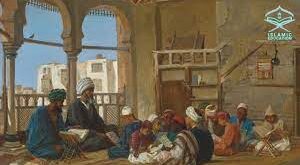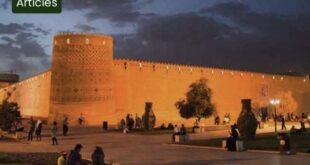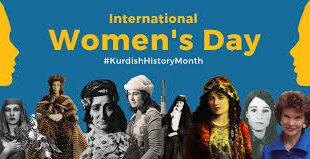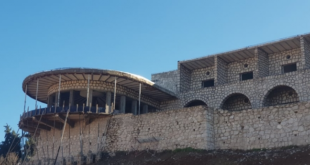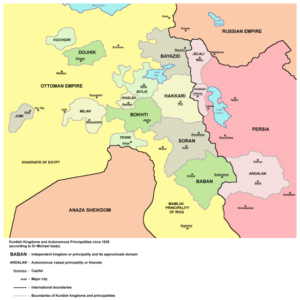
The family of Baban (1649–1850) ruled a Kurdish principality which encompassed areas of present-day Iraqi Kurdistan and western Iran from the early 17th century until 1850. The Baban principality played an active role in Ottoman-Persian conflict. The founder of the princely Baban family is thought to be Ahmad Faqih or Faqi Ahmad from the district of Pijder.[1] The Babans claimed descent from a Frankish woman, Keghan, who was taken prisoner in a battle by the Ottomans. According to the Sharafnama the clan’s first chief was Pir Badak Babe, who is believed to have lived around 1500.[2]
Baban princes retained some autonomy in return for providing security for the Ottoman Empire along the Iranian border. Sulaiman Beg was the first Baban prince to gain control of the province of Shahrizor and its capital, Kirkuk. He invaded Iran, defeating forces from the principality of Ardalan in 1694. Ottoman Sultan Mustafa II assigned him the district of Baban, which included the town of Kirkuk.[3]
The city of Sulaimaniyah was also known as the capital of baban founded by Baban prince Mahmud Pasha in 1781.[4] Baban rulers encouraged cultural and literary activities in their domain. During the first half of the 19th century a school of poetry was established under Baban patronage, of which classical Kurdish poet Nali was the central figure.[5]
Baban princes aided Ottoman forces in Iranian wars from 1723–1746. From 1750 to 1847, Baban history was dominated by rivalries with other Kurdish principalities (such as Soran and Bohtan) and its opposition to centralization by the Ottomans and the Qajars.[6] The principality was destroyed during the mid-19th century Ottoman modernization period. The Baban revolt lasted for three years, but was defeated by a coalition of Ottoman forces and Kurdish tribes. Ahmed Pasha Baban, the last Baban ruler, was defeated near Koya in 1847 and the region of Shahrazur was annexed to the Ottoman Empire. The last Baban prince left Sulaimaniya in 1850, after fighting the Turks for the independence of southern Kurdistan.[7]
Timeline
- Khana Mohammad Pasha takes the city of Senna, capital of the Ardalan principality, in 1132 ( 1719 AD )[8] and kills Persian governor Hasan Ali Khan.[9]
- Suliman Baba travels to Constantinople in 1678, gaining Ottoman recognition of the family’s hereditary rights.[10]
- Baban princes helped Ottoman forces in the Iranian wars of 1723–1746.[11]
- Abdulrahman Pasha becomes mirimiran prince of Kurdish princes in 1788.[12]
- Abdurrahman Pasha marches on Ottoman Pasha of Baghdad Suleyman in June 1810 with 10,000 men.[13]
Princes
- Faqi Ahmad, 1649–1670
- Sulaiman Baba, 1670–1703
- Khana Mohammad Pasha, 1721–1731
- Nawaub Khalid Pasha, 1732–1742
- Nawaub Salim Pasha, 1742–1754
- Nawaub Sulaiman Pasha, 1754–1765
- Muhammad Pasha, 1765–1775
- Abdolla Pasha, 1775–1777
- Ahmad Pasha, 1777–1780
- Mahmoud Pasha, 1780–1782
- Ibrahim Pasha, 1782–1803
- Abdurrahman Pasha, 1803–1813
- Mahmoud Pasha, 1813–1834
- Sulaiman Pasha, 1834–1838
- Ahmad Pasha, 1838–1847
- Abdollah Pasha, 1847–1850
Notable descendants
- Babanzade Mustafa Zihni Pasha (1839–1911)
- Babanzade Ahmed Naim Bey, (1872–1934): Rector of Istanbul University and Islamist philosopher, who was appointed to the Ayan Meclisi by Sultan Mehmed VI
- Babanzade Ismail Hakki Bey (1876–1913): Ottoman Minister of Education, Minister of Public Instruction, Member of Parliament and foreign-affairs expert
- Babanzade Hüseyin Şükrü Bey, (1890–1980): Dean of the Faculty of Economics at Istanbul University and editor-in-chief of Tercüman
- Babanzade Cihad Bey, (1911–1984): Minister of Press, Radio and Tourism, Minister of Culture of the Republic of Turkey, member of the Grand National Assembly of Turkey for Istanbul and İzmir (1946–1950), editor-in-chief of the newspaper Ulus and owner of the newspaper Tasvir
- Babanzade Hamdi Bey: Member of the Committee of Union and Progress
- Babanzade Hikmet Bey: Founding member of Kürdistan Teâli Cemiyeti and the Committee of Union and Progress
- Babanzade Selim Bey: editor-in-chief of the Son Telgraf
- Babanzade Ismail Pasha (1839–1920)
- Babanzade Fuad Bey
- Babanzade Jamil Sidqi al-Zahawi: Iraqi poet and philosopher
- Babanzade Mohammed Najmuldeen: One of the founding members of the first Telecommunication companies in Iraq AsiaCell TC. and the Chief technology officer in it.
- Ahmad Mukhtar Baban : the last Prime Minister of Iraq under the monarchy in 1958.[14]
- Baban, Donya. Doctor in Bradford, United Kingdom.
- Baban Serwan M. J. (b.1958). A Professor, Author and a Technocrat. Serwan holds Ph.D. and D.Sc. qualifications from the University of East Anglia, UK. He is a Fellow of the Royal Geographical Society (FRGS), Fellow of the Geological Society (FGS), Fellow of the Remote Sensing and Photogrammetry Society (FRSPSoc) and a Fellow of the International Congress of Disaster Management (FICDM). Professor Baban is currently the Chief Scientific Advisor, the Presidency of the Council of Ministers, Kurdistan Regional Government, Iraq. His immediate previous position was Professor and Vice Chancellor, Cihan University, Kurdistan Region, Iraq (2014-2017). Prior to that he was the Minister of Agriculture and Water Resources, Kurdistan Region, Iraq (2012-2014), and the Vice Chancellor, University of Kurdistan Hewler (UKH), Erbil, Iraq (2009-2012). Prior to 2009 he held senior academic and management positions in universities in the UK, Caribbean region and Australia.
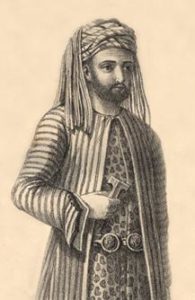
Omar Agha (officer for Mahmoud Pasha of Baban), 1820
References:
- W. Behn, Baban, Encyclopaedia Iranica
- ^ M. Th. Houtsma, A.J. Wensinck, H.A.R. Gibb, W. Heffening and E. Levi-Provencal, First encyclopaedia of Islam (1993), Vol.VII, p.538, BRILL Publishers
- ^ Gábor Ágoston, Bruce Alan Masters (2009), Encyclopedia of the Ottoman Empire, p.70, Infobase Publishing, ISBN 9781438110257
- ^ W. Behn, Baban, Encyclopaedia Iranica
- ^ Farhad Shakely, The Kurdish Qasida in Stefan Sperl, P. M. Kurpershoek, C. Shackle (1996), The Poetry of Ad-Dindān: A Bedouin Bard in Southern Najd, p.337, BRILL
- ^ W. Behn, Baban, Encyclopaedia Iranica
- ^ Ely Banister Soane (2007), To Mesopotamia and Kurdistan in Disguise, p.371, Cosimo, Inc.
- ^ International Association of Academies (1934), The encyclopaedia of Islām: a dictionary of the geography, ethnography and biography of the Muhammadan peoples, p.227, E. J. Brill ltd.
- ^ Peter Avery, William Bayne Fisher, Gavin Hambly, Charles Melville (1991), The Cambridge history of Iran: From Nadir Shah to the Islamic Republic, p.138, Cambridge University Press
- ^ Claudius James Rich (1836), Narrative of a residence in Koordistan, p.81, J. Duncan
- ^ H. J. Kissling, N. Barbour, Bertold Spuler, J. S. Trimingham, F. R. C. Bagley, H. Braun, H. Hartel (1997), The Last Great Muslim Empires, p.82, BRILL
- ^ Tom Nieuwenhuis (1982), Politics and society in early modern Iraq: Mamluk Pashas tribal Shayks and local rule between 1802 and ‘, p.42, Springer
- ^ Virginia H. Aksan (2007), Ottoman wars 1700-1870, an empire besieged, p.286, Pearson Education
- ^ Ahmad Mukhtar Baban
Sources:
- Narrative of a residence in Koordistan, Claudius James Rich, James Duncan, Paternoster Row, 1836.
- The Sharafnama, Sharaf Khān Bidlīsī, 1597.
- The Emirate of Baban between the grinding stones of the Persians and Turks, Nawshirwan Mustafa, Zargata, 1998.
- The caravan of death, Karl Friedrich May, Seabury Press, 1979.
- First encyclopaedia of Islam: 1913-1936, M. Th Houtsma, BRILL, 1993.
- Encyclopedia of the Ottoman Empire, Gábor Ágoston, Bruce Alan Masters, Infobase Publishing, 2009.
- A modern history of the Kurds, David McDowall, I.B.Tauris, 2000.
- Politics of Alliance and Rivalry on the Ottoman-Iranian Frontier: The Babans (1500-1851). Metin Atmaca, Self-publishing, Freiburg im Breisgau 2013.
 History of Kurdistan
History of Kurdistan
